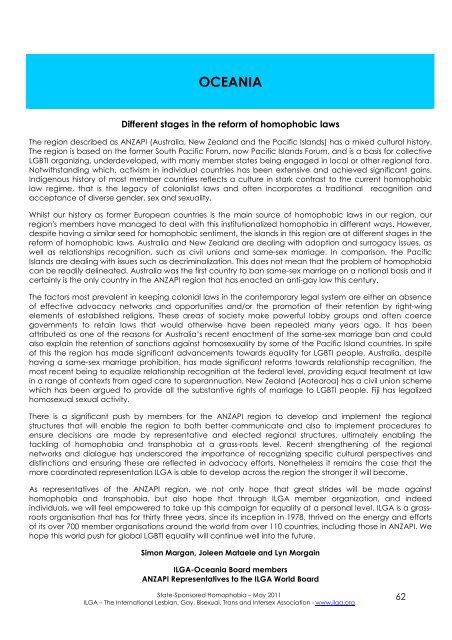ILGA_State_Sponsored_Homophobia_2012
ILGA_State_Sponsored_Homophobia_2012
ILGA_State_Sponsored_Homophobia_2012
You also want an ePaper? Increase the reach of your titles
YUMPU automatically turns print PDFs into web optimized ePapers that Google loves.
OCEANIA<br />
Different stages in the reform of homophobic laws<br />
The region described as ANZAPI (Australia, New Zealand and the Pacific Islands) has a mixed cultural history.<br />
The region is based on the former South Pacific Forum, now Pacific Islands Forum, and is a basis for collective<br />
LGBTI organizing, underdeveloped, with many member states being engaged in local or other regional fora.<br />
Notwithstanding which, activism in individual countries has been extensive and achieved significant gains.<br />
Indigenous history of most member countries reflects a culture in stark contrast to the current homophobic<br />
law regime, that is the legacy of colonialist laws and often incorporates a traditional recognition and<br />
acceptance of diverse gender, sex and sexuality.<br />
Whilst our history as former European countries is the main source of homophobic laws in our region, our<br />
region's members have managed to deal with this institutionalized homophobia in different ways. However,<br />
despite having a similar seed for homophobic sentiment, the islands in this region are at different stages in the<br />
reform of homophobic laws. Australia and New Zealand are dealing with adoption and surrogacy issues, as<br />
well as relationships recognition, such as civil unions and same-sex marriage. In comparison, the Pacific<br />
Islands are dealing with issues such as decriminalization. This does not mean that the problem of homophobia<br />
can be readily delineated. Australia was the first country to ban same-sex marriage on a national basis and it<br />
certainly is the only country in the ANZAPI region that has enacted an anti-gay law this century.<br />
The factors most prevalent in keeping colonial laws in the contemporary legal system are either an absence<br />
of effective advocacy networks and opportunities and/or the promotion of their retention by right-wing<br />
elements of established religions. These areas of society make powerful lobby groups and often coerce<br />
governments to retain laws that would otherwise have been repealed many years ago. It has been<br />
attributed as one of the reasons for Australia’s recent enactment of the same-sex marriage ban and could<br />
also explain the retention of sanctions against homosexuality by some of the Pacific Island countries. In spite<br />
of this the region has made significant advancements towards equality for LGBTI people. Australia, despite<br />
having a same-sex marriage prohibition, has made significant reforms towards relationship recognition, the<br />
most recent being to equalize relationship recognition at the federal level, providing equal treatment at law<br />
in a range of contexts from aged care to superannuation. New Zealand (Aotearoa) has a civil union scheme<br />
which has been argued to provide all the substantive rights of marriage to LGBTI people. Fiji has legalized<br />
homosexual sexual activity.<br />
There is a significant push by members for the ANZAPI region to develop and implement the regional<br />
structures that will enable the region to both better communicate and also to implement procedures to<br />
ensure decisions are made by representative and elected regional structures, ultimately enabling the<br />
tackling of homophobia and transphobia at a grass-roots level. Recent strengthening of the regional<br />
networks and dialogue has underscored the importance of recognizing specific cultural perspectives and<br />
distinctions and ensuring these are reflected in advocacy efforts. Nonetheless it remains the case that the<br />
more coordinated representation <strong>ILGA</strong> is able to develop across the region the stronger it will become.<br />
As representatives of the ANZAPI region, we not only hope that great strides will be made against<br />
homophobia and transphobia, but also hope that through <strong>ILGA</strong> member organization, and indeed<br />
individuals, we will feel empowered to take up this campaign for equality at a personal level. <strong>ILGA</strong> is a grassroots<br />
organisation that has for thirty three years, since its inception in 1978, thrived on the energy and efforts<br />
of its over 700 member organisations around the world from over 110 countries, including those in ANZAPI. We<br />
hope this world push for global LGBTI equality will continue well into the future.<br />
Simon Margan, Joleen Mataele and Lyn Morgain<br />
<strong>ILGA</strong>-Oceania Board members<br />
ANZAPI Representatives to the <strong>ILGA</strong> World Board<br />
<strong>State</strong>-<strong>Sponsored</strong> <strong>Homophobia</strong> – May 2011<br />
<strong>ILGA</strong> – The International Lesbian, Gay, Bisexual, Trans and Intersex Association - www.ilga.org<br />
62


